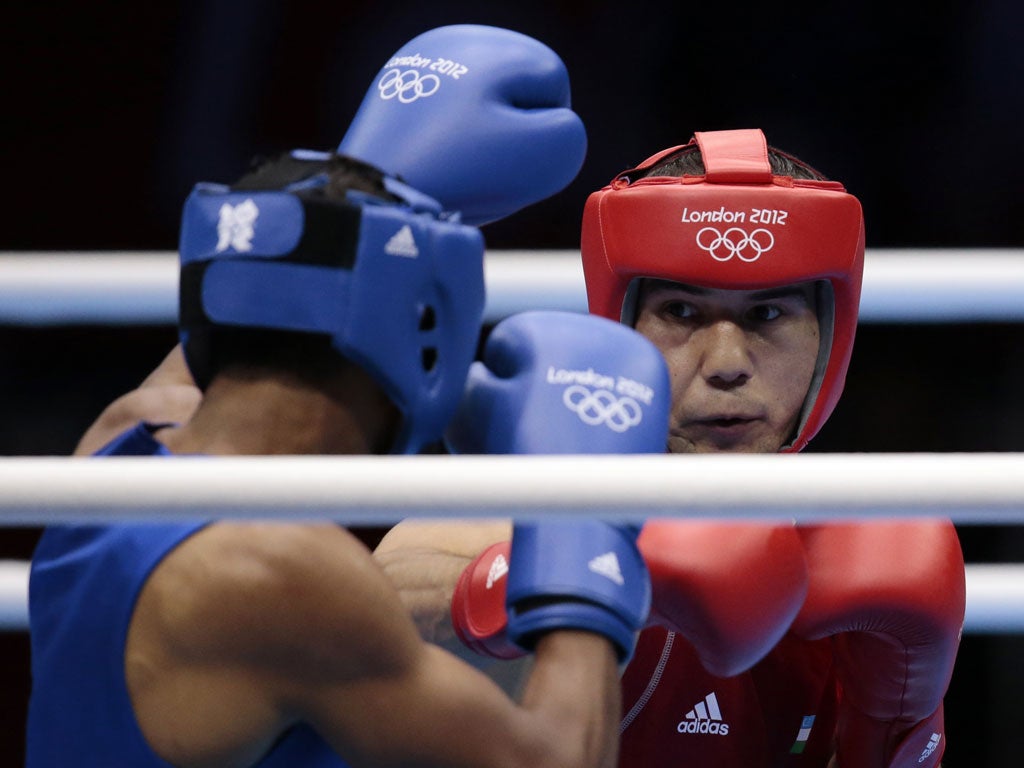Chris Hewett: Dodgy decisions are rife at the boxing... but who am I to judge?
The critic without a ticket: It had nothing to do with the fact that the winner hailed from nowhere further than Great Yarmouth

Now we have made Olympic history by successfully pleading the "lost in translation" defence even though English sentences spoken in England by a British competitor (albeit a half-German one) do not usually need translating into English, there are endless get-out-of-jail-free cards to be played by those who, like the cyclist Philip Hindes, find themselves struggling for the optimum start. If Dwayne Chambers does not quite feel he has Usain Bolt's number in the opening split-seconds of the 100m dash, he can always fall over and have another go. If Ben Ainslie falls behind that bearded Dane for the umpteenth time, why not capsize? It would be perfectly safe. This is Weymouth we're talking about, not Cape Horn.
Once upon a time, racing sports like running and swimming and cycling were easier on the eye, not to mention the brain, than judged sports like boxing and diving and gymnastics. The athlete who crossed the line or reached the end before everyone else was adjudged the winner and nothing could change the fact, always assuming he or she did not test positive for some miserably tacky performance-enhancing chemical at a later date. What could be simpler?
There is nothing simple about it now. In the pool, a swimmer can be adjudged the loser if, in touching the wall first, he fails to touch it hard enough. Milorad Cavic discovered this to his cost in the 100m butterfly in Beijing four years ago, although the wheel of fortune has since turned full circle: Michael Phelps, the beneficiary on that occasion, lost the 200m version to Chad le Clos of South Africa in what amounted to a simultaneous finish on Tuesday night.
Life in the velodrome presents even more of a challenge to our most deep-seated notions of victory and defeat. It doesn't much matter if four riders, two each from Great Britain and China, smithereen the world team sprint record if a commissaire in a suit decides someone overtook someone else in the wrong part of the track. Which brings to mind the old joke about a man who, on being asked to fill in a questionnaire, thumped the nearest official. If only…
Talking of thumping, the boxing competition is in its usual smoke-and-mirrors mode, with the judging every bit as much a subject of discussion as the fighting. The BBC commentator Jim Neilly, second-voiced by his cornerman Richie Woodhall, struggled to make sense of the decision that sent Abbos Atoev, a middleweight from Uzbekistan, into the last eight at the expense of Bogdan Juratoni of Romania. Indeed, he admitted as much on air.
If there was slightly less publicly expressed perplexity about the verdict that gave Anthony Ogogo a place in the quarter-finals of the same class ahead of the dangerous Ukrainian challenger Ievgen Khytrov, it surely had nothing to do with the fact that the winner hailed from nowhere further east than Great Yarmouth.
"I don't care what the law is – just tell me who the judge is." Many an attorney has trotted out this line in recent years, perhaps as a result of watching boxing, the Olympic sport with the richest and least glorious history of rank injustice.
This history reached its nadir in Seoul, where some decisions were sufficiently peculiar to persuade the authoriti es to subject judges to alcohol tests in an effort to ensure they got themselves bladdered after viewing the fights, not before. Nowadays, there is a computerised scoring system, presumably introduced on the grounds that computers don't drink, but even this has almighty flaws.
As Woodhall, a high-class operator who struck bronze in the light-middleweight tournament at those infamous '88 Games, pointed out during the outstanding scrap between Vijendra Singh of India, all bang and Bollywood, and the slippery Terrell Gausha of the US, there is nothing to be gained by a fighter going for combinations, as only one punch is likely to register. On that basis, it might have been a Pole called Zbigniew Pietrzykowski who won gold in Rome a little over half a century ago, not a Yank by the name of Cassius Clay.
Boxing finds itself in a difficult place among the "judged" sports of these Games, for the simple reason that it is not gymnastics or fencing. Who among the great unwashed can argue with those officials who measure the accuracy of a piked Tkatchev on the high bar or a three-quarter twisting Omelianchik on the beam? We wouldn't recognise an Omelianchik if we ran over it in the car. As for the foil and sabre stuff, one does not learn to distinguish one's balestra from one's flèche by watching Oliver Reed flounce around in The Three Musketeers.
By contrast, everyone with a pair of eyes knows enough about boxing to appreciate the fundamentals. The sweet science is not rocket science. People know when one fighter is dominant and the other subservient – when one has dynamite in his gloves and the other kryptonite. There has been no overwhelming scandal in London as yet, although Khytrov felt sufficiently aggrieved to appeal against the decision in his bout with Ogogo. It will, however, be a major surprise if at least one boxer doesn't leave the country thinking he would have needed a knockout to earn himself a draw.
Subscribe to Independent Premium to bookmark this article
Want to bookmark your favourite articles and stories to read or reference later? Start your Independent Premium subscription today.

Join our commenting forum
Join thought-provoking conversations, follow other Independent readers and see their replies